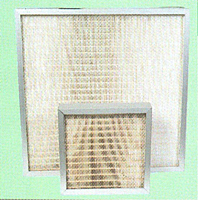Liberty Industries HEPA and ULPA filters
 HEPA and ULPA filters are key to contamination control in a cleanroom, because they remove airborne particulates from the air intake, plus recycle and filter existing air in the controlled area. First used to reduce radioactive contaminate in the 1940’s famous “Manhattan” government project, HEPA (High-Efficiency Particulate Air) filters must meet strict government standards of the U.S. Dept. of Energy (D.O.E.) to qualify for that title, and are designed to eliminate a minimum of 99.97% of particles that are .3 micrometer (microns) or larger.
HEPA and ULPA filters are key to contamination control in a cleanroom, because they remove airborne particulates from the air intake, plus recycle and filter existing air in the controlled area. First used to reduce radioactive contaminate in the 1940’s famous “Manhattan” government project, HEPA (High-Efficiency Particulate Air) filters must meet strict government standards of the U.S. Dept. of Energy (D.O.E.) to qualify for that title, and are designed to eliminate a minimum of 99.97% of particles that are .3 micrometer (microns) or larger.
Another factor: at its nominal flow rate, the pressure drop (minimal resistance to airflow) of a HEPA filter is to be 300 Pascal Units. While HEPA filters are typically used in various manufacturing scenarios such as laboratories, specialty manufacturing such as nuclear power and fuel or micro-electronics and aerospace, the medical and pharmaceutical (including hospitals & healthcare), car manufacturing and aircraft, etc., HEPA filters are also often found in selected products such as special-purpose vacuums, and have even reached the home market, for example, to remove cat dandruff or in a hair blower.
HEPA Filters Usage
Because of the unique nature of HEPA filters, the user must be cautious if they attempt to switch one grade with another, usually a cheaper one, since some filters that ARE HEPA-certified do NOT meet interior class requirements. (See the NIOSH N100 rating which is used with regard to respiratory filters.)
HEPA Filters From Liberty Industries, Inc.
Liberty Industry’s efficient HEPA filters, and also their higher-level ULPA (Ultra-Low Penetration Air) filters, optimize air flow by being manufactured according to IES (Institute of Environmental Sciences) RP standards, as well as Federal Standard 209 & I.S.O 14644-1.
The HEPA’s are 99.99% efficient at .3 microns and larger (the MPPS–Most Penetrating Particle Size). Their ULPA’s are 99.9999% efficient at .12 microns.
These kinds of filters are typically made of fiberglass .5 to 2 micrometers diameter that are arranged in a random fashion so that the particles are collected in it by adhering to the fibers, by getting stuck within fibers, or by smaller particulate linking with gas molecules and the resulting combination being less difficult to make it through the filter. As a result, they can sieve smaller particles better than membrane filters.
Also critical to the making of specialty air filters is the frame. Liberty’s are extruded from an anodized aluminum, and are fastened mechanically so that leakage or loosening don’t occur. To meet MIL-STD-F51008, they bond the .25 X .75 inch poron gasket to the filter frame to keep air from by-passing. There are no separators in a Liberty filter as they are made with mini-pleats.
The HEPA and ULPA filters come in a wide range of 3 inch thick sizes. (All of the following filters are 3 inches thick.)
12 inch wide filters come in lengths of 12/18 and 24 inches.
18 inch wide filters are 24 inches long.
20 inch wide filters come in lengths of 48 and 72 inches.
24 and 30 inch wide filters come in lengths of 24/30/36/48/60 and 72inches.
36 inch wide filters come in lengths of 36/48/60 and 72inches.
Liberty also offers a 5 and 7/8’s inch thick filter which is 23 and 5/8’s inches wide and comes in lengths of 23 and 5/8’s inches and 47 and 5/8’s inches.
And finally, they offer a filter that is 11 and ½ inch thick and is 24 inches wide by 24 inches long.
Liberty also offers carbon pre-filters and pleated filters.
Because of the danger of damage during transport, extreme care is made to package filters for shipping, as are the ceiling modules or FFU fan filter units in which they’re used. Also including 1 downstream gasket, Liberty Industries filters come in cartons with each filter individually packaged, carefully placed on skids and banded for transportation via the common carrier of your choice or “best way.” Even more special protective packaging or putting the filters in crates made of solid wood are also possible for an upcharge.
